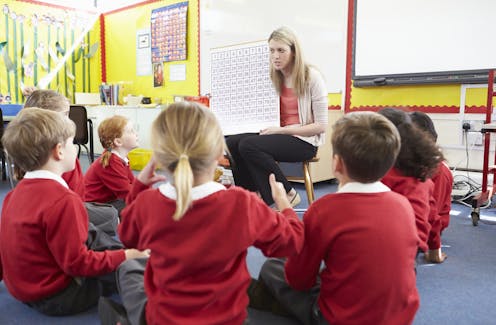Is there a ‘right way’ to teach? Recent debates suggest yes, but students and schools are much more complex
- Written by Jane Louise Hunter, Associate Professor, Teacher Education, University of Technology Sydney

New South Wales has just announced a curriculum “shake-up[1]” for primary schools[2] to start in 2027.
As well as new content about the human body, consent and screen time, there will be a change in the way students will be taught. This involves an emphasis on “explicit instruction” and a move away[3] from student-led or “inquiry-based learning”.
This follows recent moves in Victoria[4] and Queensland[5], to implement “explicit instruction” around reading.
What does this mean?
Explicit instruction
According to the NSW Education Department, explicit instruction or teaching[6] involves teachers “clearly explaining, demonstrating and modelling to students” why they are learning something, what they need to learn and how it connects to what they already know.
It does not involve “students engaging in independent learning activities and problem solving before teachers provide the necessary explanations, demonstration or modelling”. This latter approach describes “inquiry-based learning”.
This approach prioritises[7] critical and creative thinking so students can develop their abilities to ask questions, interpret evidence, form explanations and arguments, and communicate findings.
Announcing the changes this week, NSW Education Minister Prue Car said[8]:
For the first time, primary school teachers have a set of syllabuses that make sense together […] Teachers will have clarity on exactly what they need to teach, based on evidence.
But the way this evidence is presented is problematic[9].
Is it really one or the other?
These changes and the media coverage around them suggest there are binaries or “either/or” options when it comes to teaching methods.
For example, those in favour of explicit teaching claim they have found “what works best[11]” in the classroom. As the Australian Education Research Organisation notes[12], it “allows students to process new information more effectively”.
Yet my research[13] on successful approaches in Australian classrooms reveals teachers use a range of strategies to teach and engage students.
This is important because research shows[14] exposing students to different kinds of learning experiences is important for their development. One teaching approach in one school for one student in one subject will differ for another in another content area. Context matters.
So teachers need to be able to use their professional judgement[15] in the classroom. This is why some scholars argue we should see teaching as an art[16] and not a precise science.
Why are we having this debate?
We see regular headlines students are “falling behind[17]” and schools are failing[18] (even though this is not necessarily accurate[19]). This is combined with ongoing criticism our teachers are not adequately prepared[20] for the classroom.
But politicians have a vested interest in the school system being (or appearing to be) “successful” for parents and voters. As my co-author Don Carter’s research[21] shows, education minister’s offices often seek rapid answers to wickedly complex challenges in schools.
Australian schools are facing acute teacher shortages[22], funding shortfalls[23] and big gaps[24] in outcomes for advantaged and disadvantaged students. These are not simple issues.
It is also important to note you can use “evidence” to justify multiple stances. For example, when it comes to the pros and cons of single sex versus co-ed schools, there is research to support both sides[25].
The same is true when it comes to teaching methods[26].
Meanwhile, some of the evidence[27] used in these debates is from think tanks whose research is not awarded through competitive grants[28] or peer-review by other academics.
What does this mean for schools and families?
Some of these policy changes will mean teachers are changing how they teach, but often will simply continue to do what they have always done.
But these debates can have a cost as they once more suggest[30] teachers don’t know how to teach effectively or need more help to do so.
Current debates about teaching can also be confusing for parents who hear about falling standards and the need for new methods. It also presents schooling as a “cookie cutter” experience[31] where a child is sent to learn and behave in certain ways.
For parents, it may help to remember the most important things have not changed: your child is progressing at school, they are engaged in what they are learning and they are happy to go.
References
- ^ shake-up (www.abc.net.au)
- ^ primary schools (www.nsw.gov.au)
- ^ move away (www.smh.com.au)
- ^ Victoria (www.abc.net.au)
- ^ Queensland (statements.qld.gov.au)
- ^ explicit instruction or teaching (education.nsw.gov.au)
- ^ prioritises (www.education.gov.au)
- ^ said (education.nsw.gov.au)
- ^ problematic (blog.aare.edu.au)
- ^ Dimitry Pistrov/ Shutterstock (www.shutterstock.com)
- ^ what works best (education.nsw.gov.au)
- ^ notes (www.edresearch.edu.au)
- ^ research (www.routledge.com)
- ^ research shows (www.newcastle.edu.au)
- ^ professional judgement (www.tandfonline.com)
- ^ teaching as an art (www.taylorfrancis.com)
- ^ falling behind (www.afr.com)
- ^ schools are failing (www.afr.com)
- ^ necessarily accurate (www.une.edu.au)
- ^ not adequately prepared (www.smh.com.au)
- ^ research (www.routledge.com)
- ^ teacher shortages (theconversation.com)
- ^ funding shortfalls (www.abc.net.au)
- ^ big gaps (theconversation.com)
- ^ research to support both sides (theconversation.com)
- ^ teaching methods (www.mdpi.com)
- ^ evidence (www.theaustralian.com.au)
- ^ through competitive grants (www.arc.gov.au)
- ^ Juice Verve/Shutterstock (www.shutterstock.com)
- ^ once more suggest (theconversation.com)
- ^ “cookie cutter” experience (www.abc.net.au)
















